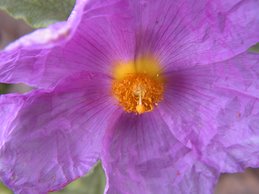Thalia
of no other animal. You find in a hare's belly, at one and the same
time, some of the young all covered with fur, others quite naked,
others again just fully formed in the womb, while the hare perhaps has
lately conceived afresh. The lioness, on the other hand, which is
one of the strongest and boldest of brutes, brings forth young but
once in her lifetime, and then a single cub; she cannot possibly
conceive again, since she loses her womb at the same time that she
drops her young. The reason of this is that as soon as the cub
begins to stir inside the dam, his claws, which are sharper than those
of any other animal, scratch the womb; as the time goes on, and he
grows bigger, he tears it ever more and more; so that at last, when
the birth comes, there is not a morsel in the whole womb that is
sound.
Now with respect to the vipers and the winged snakes of Arabia, if
they increased as fast as their nature would allow, impossible were it
for man to maintain himself upon the earth. Accordingly it is found
that when the male and female come together, at the very moment of
impregnation, the female seizes the male by the neck, and having
once fastened, cannot be brought to leave go till she has bit the neck
entirely through. And so the male perishes; but after a while he is
revenged upon the female by means of the young, which, while still
unborn, gnaw a passage through the womb, and then through the belly of
their mother, and so make their entrance into the world. Contrariwise,
other snakes, which are harmless, lay eggs, and hatch a vast number of
young. Vipers are found in all parts of the world, but the winged
serpents are nowhere seen except in Arabia, where they are all
congregated together. This makes them appear so numerous.
Such, then, is the way in which the Arabians obtain their
frankincense; their manner of collecting the cassia is the following:-
They cover all their body and their face with the hides of oxen and
other skins, leaving only holes for the eyes, and thus protected go in
search of the cassia, which grows in a lake of no great depth. All
round the shores and in the lake itself there dwell a number of winged
animals, much resembling bats, which screech horribly, and are very
valiant. These creatures they must keep from their eyes all the
while that they gather the cassia.
Still more wonderful is the mode in which they collect the
cinnamon. Where the wood grows, and what country produces it, they
cannot tell- only some, following probability, relate that it comes
from the country in which Bacchus was brought up. Great birds, they
say, bring the sticks which we Greeks, taking the word from the
Phoenicians, call cinnamon, and carry them up into the air to make
their nests. These are fastened with a sort of mud to a sheer face
of rock, where no foot of man is able to climb. So the Arabians, to
get the cinnamon, use the following artifice. They cut all the oxen
and asses and beasts of burthen that die in their land into large
pieces, which they carry with them into those regions, and Place
near the nests: then they withdraw to a distance, and the old birds,
swooping down, seize the pieces of meat and fly with them up to
their nests; which, not being able to support the weight, break off
and fall to the ground. Hereupon the Arabians return and collect the
cinnamon, which is afterwards carried from Arabia into other
countries.
Ledanum, which the Arabs call ladanum, is procured in a yet
stranger fashion. Found in a most inodorous place, it is the
sweetest-scented of all substances. It is gathered from the beards
of he-goats, where it is found sticking like gum, having come from the
bushes on which they browse. It is used in many sorts of unguents, and
is what the Arabs burn chiefly as incense.
Concerning the spices of Arabia let no more be said. The whole
country is scented with them, and exhales an odour marvellously sweet.
There are also in Arabia two kinds of sheep worthy of admiration,
the like of which is nowhere else to be seen; the one kind has long
tails, not less than three cubits in length, which, if they were
skip to main |
skip to sidebar
Followers
ladanum-cistus in GREEK
Blog Archive
-
▼
2006
(13)
-
▼
November
(12)
- Bibliografia Cistus
- Cistus creticus subsp incanus - Cistaceae - Rock Rose
- Balm of Gilead
- cistus,ladanum,labdanum info-sites-links
- Cistus creticus (Cistaceae) - Fragrant Rockrose
- Cistaceae by Olivier Filippi
- Cistus creticus L.
- The Rockroses by Ken Montgomery
- ladanum in bible
- Perfumery and ladanum
- Laudanum (# than ladanum,labdanum)
- ladanum(ledanum) in Herodotus-Thalia
-
▼
November
(12)



No comments:
Post a Comment